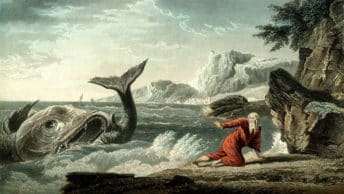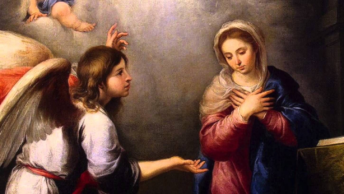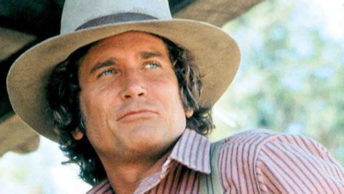One of the most famous bridges in the United States, and in fact the entire world, is the Brooklyn Bridge, which connects the boroughs of Brooklyn and Manhattan in New York City. It was the world’s first steel-wire suspension bridge, and was also the largest suspension bridge at the time of its completion in 1883. Even though it was finished before automobiles had been invented, almost 140 years later, it’s still capable of carrying heavy volumes of traffic every day—in part because its foresighted architect insisted it be built to carry five times the weight of its projected traffic, rather than the usual safety factor of three. We would assume that such a beautiful, magnificent, and impressive bridge was built under the supervision of an equally impressive engineer—and we’d be right, but not in the way we might expect. The man most responsible for the Brooklyn Bridge oversaw the majority of this fourteen years project not from the construction site, but from his hospital bed, where he lay in a condition of almost total paralysis.
In 1869 an experienced architect named John Roebling came up with the idea for building the bridge. Every other expert had considered it impossible because of the distance and the heavy water currents involved, but Roebling showed his son Washington, an engineer, how it could be done. The two of them worked out their plans, convinced bankers to fund the project, and hired a work crew. However, just a few months later a tragic accident at the work site killed John Roebling and critically injured his son. Washington Roebling suffered severe brain damage, leaving him unable to walk or talk. Everyone assumed the bridge would have to be cancelled, since only the Roeblings understood how this apparently impossible project could be undertaken. Washington Roebling, however, though confined to bed, was still able to think clearly, and was determined to see the bridge built. He discovered he could still move one finger, so he touched his wife on her arm, tapping out a message in Morse code. For thirteen long years he used this method to relay instructions to the engineers still working on the project, and the end result was one of the most impressive man-made structures in history (Brian Cavanagh, Fresh Packet of Sower’s Seeds, p. 26). Washington Roebling, having no resources other than his faith, his mind, and one movable finger, was able to overcome incredible odds and achieve something amazing. In the same way, even when we’re heavily burdened and extremely limited in what we can do, Jesus will help us carry our cross and achieve worthwhile things in His Name.
God’s ways are different from those of the world, and that’s why, with the help of His grace, human greatness is often found in surprising places. The prophet Zechariah foretold that the long-awaited King and Savior of Israel would come not at the head of a huge and powerful army, surrounded by royal servants and mounted on a magnificent stallion. No, the great King Who would establish a universal realm of peace would come meekly, mounted on an ass, contrary to all worldly expectations. St. Paul tells us that if we are to be Christ’s followers, we must set aside worldly expectations; instead of living in the flesh—which means according to the values of this world—we must live in the spirit by placing God’s Will first. Jesus promises our efforts to do this will give us a true knowledge of God. He also says that if we take our faith seriously, there will be times when we are weak, tired, or heavily-burdened—but He promises us that He will be with us, giving us the strength, consolation, and courage we need to continue our journey.
A priest once preached on the Gospel of Matthew (11:25-30)in a small rural parish in Kansas. After Mass a parishioner spoke to him and said, “My grandfather used to plow with a team of oxen, and he used a yoke—but it never balanced. He deliberately built it heavier on one side and then hitched the stronger ox there; the weaker ox, which couldn’t pull much, was hitched to the other side of the yoke, which was much lighter—and this arrangement worked.” The priest realized this was a perfect illustration of how Jesus does the “heavy lifting” in helping us bear our burdens—if we have the humility and trust to hitch ourselves to Him (Msgr. Arthur Tonne, Stories for Sermons, Vol. 2, #389).
I’m sure all of us have had times when we’ve found it hard or inconvenient to do the morally right thing, times when we’ve felt there really is a sacrifice involved in living as a Christian. Yet we’ve continued to make this effort, and we know it’s the right thing to do, and also what we want to do. The reason for this is that Jesus has strengthened us, letting us discover that indeed His yoke is easy and His burden light. In effect, by hitching ourselves to Jesus and following after Him, each one of us is building a bridge—but not across a river; rather, we’re trying to bridge or connect our life on earth with the promised new life awaiting us in Heaven. Some people in our society would claim this is impossible, that the effort is a waste of time because Heaven doesn’t exist, or that we don’t have the resources necessary to get there, or even that it’s not necessary for us to try, because when we die we’ll automatically enter into Heaven no matter how badly or selfishly we’ve lived on earth. All these ideas are wrong and spiritually dangerous. Heaven does exist, but no one is entitled to it or automatically guaranteed of going there. Eternal life is a free and unmerited gift offered to us by Jesus Christ; we have to accept His invitation, and actively live out our response each day in a faithful and loving manner. This will often be hard to do, and that’s why Our Lord offers us His words of reassurance in the Gospel.
We may be heavily burdened by a major physical disability, as was Washington Roebling, but it’s more likely we’ll struggle at one point or another with something along the lines of poor health, financial or employment worries, family problems, discrimination, grief, loneliness, depression, or simply feeling misunderstood or unappreciated. Whatever our particular cross may be, Jesus will help us bear it and find heavenly happiness and success because of it. Choosing to be yoked to Jesus is the wisest decision we can ever make. His strength allows ordinary people like us to do wonderful and amazing things, and His grace can turn sinners like us into citizens of the Kingdom of Heaven. Let us place our hope in His promise, for in this way we will find the rest and the peace we seek.








